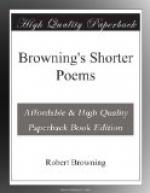LIFE OF BROWNING
Robert Browning was born in Camberwell, London, May 7, 1812. He was contemporary with Tennyson, Dickens, Thackeray, Lowell, Emerson, Hawthorne, Darwin, Spencer, Huxley, Dumas, Hugo, Mendelssohn, Wagner, and a score of other men famous in art and science.
Browning’s good fortune began with his birth. His father, a clerk in the Bank of England, possessed ample means for the education of his children. He had artistic and literary tastes, a mind richly stored with philosophy, history, literature, and legend, some repute as a maker of verses, and a liberality that led him to assist his gifted son in following his bent. From his father Robert inherited his literary tastes and his vigorous health; in his father he found a critic and companion. His mother was described by Carlyle as a type of the true Scotch gentlewoman. Her “fathomless charity,” her love of music, and her deep religious feeling reappear in the poet.
Free from struggles with adversity, and devoid of public or stirring incidents, the story of Browning’s life is soon told. It was the life of a scholar and man of letters, devoted to the study of poetry, philosophy, history; to the contemplation of the lives of men and women; and to the exercise of his chosen vocation.
His school life was of meagre extent. He attended a private academy, read at home under a tutor, and for two years attended the University of London. When asked in his later life whether he had been to Oxford or Cambridge, he used to say, “Italy was my University,” And, indeed, his many poems on Italian themes bear testimony to the profound influence of Italy upon him. In his teens, he came under the influence of Pope and Byron, and wrote verses after their styles. Then Shelley came by accident in his way, and became to the boy the model of poetic excellence.
In 1838 appeared his first published poem, Pauline. It bears the marks of his peculiar genius; it has the germs of his merits and his defects. Though not widely read, it received favorable notice from some of the critics. In 1835 appeared Paracelsus, in 1837 Strafford, in 1840 Sordello. From this time on, for the fifty remaining years of his life, his poetic activity hardly ceased, though his poetry was of uneven excellence. The middle period of his work, beginning with Bells and Pomegranates in 1842, and ending with Balaustion’s Adventure (a transcript of Euripides’ Alcestis) in 1871, was by far the richest in poetic value.
In 1846 he married Elizabeth Barrett, the poet. They left England for Italy, where, because of Mrs. Browning’s feeble health, they continued to reside until her death in 1861. The remainder of his life was divided between England and Italy, with frequent visits to southern France. His reputation as a poet had steadily grown. He was now one of the best known men in England. His




